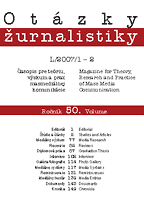
Keywords: interactivity; semantics; activating limen hypothesis; codification; contact inference; phaneron (Peirce); interactivity; the world; the picture; homo politicus; mental projection; mental identification; heterophenomenology (Dennett); blend
C. S. Peirce in his definition of the phaneron of the sign explains a representation as „that character of a thing by virtue of which, for the production of certain mental effect, it may stand in a place of another thing“. Media as a huge primordial forces set of virtual production of signs (exactly in the Peirceian way of thinking) must perform massive series of propositions too as an Instruction, how to perceive batteries of relations among signs and external realities to build a targeted interiority effect of signs in multilevel addressee – „a proposition is a sign separately indicating what it is a sign of“ (Peirce). A role of a systematic sign repertoir of media as a manipulative„super-sign“ (Eco) proposition is taken into consideration from point of view of its mental effects like psycho-contagiosity, projections, identifications, rationalisations etc.
More...
Keywords: Advertising; publicity; integrated marketing communication; public relations; direct marketing; global marketing;
Advertising originated together with the beginning of the market in ancient society. Over the centuries the means of advertising have been changing and new methods have formed the profile of advertising till our days – to present system of marketing communication. The trends of the development of advertising in the XXI century are – the integrated marketing communication, transition to global marketing and advertising, transformations in the marketing mix (change of the importance separate activities), technical improvement of advertising vehicles and increase of importance of the social marketing. But the crucial role in all these fields still belongs to the particular advertising.
More...
Keywords: globalization; peace; economy; politics; media; ethics;
In the globalization process peace is the fundamental value which should be protected by the governments and the individuals. The special attention goes towards politics and economy, culture and the crime. The media can become the main power in the formation of peace in the world but under condition that ethics will be their main and strong principle.
More...
Keywords: Media industry; medial totality; medial democracy; dramaturgic talent; medial manager; European content
Non-commercial culture, on which beginning we are just standing, will not substitute commercial culture, but it will affect and change commercial media. And, at the same time, their employees, who will have to adapt to these new forms. Flexibility as the next, third attribute of medial employees of the future. And it is necessary to add endurance, ability to understand the others and respect to creativity.
More...
Keywords: medial education; television; family; choice of TV programs; responsibility; reality and fiction;
We are educated by massmedia, but, at the same time, we should educate; ourselves and media. Freedom of choice of TV program does not enslave a recipient, criticism of broadcasters and authors of programs can contribute to production of programs supporting traditional values. Especially parents incur responsibility for medial education by being an example to follow, by choice of a program, and by discussion about watched programs.
More...
Keywords: Profession of journalist; revolution in newspaper making; printing machine and composing machine; newsprint; education of journalist;
Otázky žurnalistiky Magazine publishes the third and the last lecture of Charles Anderson Dana on journalism which was published together with the previous two, published in bimonthly issues 1 – 2 and 2 – 3 in 2006 under the title The Art of Newspaper Making (Three lectures) in 1895 by the publishing house D. Appleton & Co. in New York. A Slovak reader, especially newspaper experts, but even a journalist is given a possibility to become acquainted with an important source of reflecting upon journalism in the USA at the end of the 19th century in a developed country in the area of journalism which, in many respects, undoubtably predermined the development of journalism world-wide.
More...
Keywords: media research; ethical principles in research and publishing; audience research;
The paper deals with publishing media research results in print media. It is aimed at basic principles of sociological research practice (precision, exactitude, objectivity, systematic thinking, effectivity for society). It is also aimed at ethical principles in publishing the research results. Being aware of these principles, journalists are able to transform research results into journalists’ texts in correct, undistorted, and understandable ways. In order to develop journalistic professional competencies in understanding media research objects, the paper brings the information on the audience research. Understanding the audience is of growing importance, particularly in current world when media change the audience into market merchandise that is next sold to advertising industry.
More...
Keywords: information interpretation; context; pragmatics; pragmatic intention; communication channel;
It has been quite common recently to come across with statements such as: „It´s been taken out of the context,“ or „They´ve changend the context of my utterance,“ or „It meant an entirely different thing... my words had a different meaning.“ In this study we were therefore examining the cases when a journalist gives an incorrect interpretation of a piece of information, due to certain interference on pragmatic level of language. We have used a number of examples to indicate various options of mediating pragmatic intention in the journalistic communication, which has had its specific features, depending also on communication channels used thereby.
More...
Keywords: crisis management; crisis communication; crisis prevention; issues management; virtual crisis; crisis manual; disasters; extraordinary situations; external crisis; internal crisis; crisis management team; risk communications; causes of the crise
Crisis endangers each organization. It is only question of time, when crisis bursts out. Crisis threatens basic values, functioning and existence of the organization. Crises might be of different character, external and internal, caused by natural forces or human failures. Crises bring strong and multilateral pressures for all participants, especially managers. Effective crisis management falls into the most valued managerial skills. Many crises can be avoided by consistent issues management in the stage early stage of problem emerging. Another efficient tool to manage the crisis is the crisis manual and its systematical updating and rehearsing. Important is preventive risk communication enabling to prepare also consumers, customers, partners. Continual and open external and internal communications are inevitable part of the crises prevention and their management, as well. First step for manager to do is to check if the situation is really the crisis and react appropriately. If the crisis is there, mobilize all available resources and work on solving of the crisis and on after-the-crisis sanation. Key to success is unity and consistency of acting and communicating.
More...
Keywords: information society; myths; reality; mankind; civil society; precautionary society; cybercitizenship; ethics; informational journalism; professionalization;
The information society: a unifying topic or a problematic topic? The reality determined by mutation of technical innovations in the area of accumulation of informational data and their transmission by means of carriers or electronic channels, terrestrial and later digital through satellites, industrial and commercial expansion of all technologies and the usage by ’the information society’ is running dynamics that has abstracted from internal contradictions of communication since the beginning of sociability of a human being. The aim of the paper is to clarify the impact of new informational technologies on journalistic profession and journalism in general.
More...
Keywords: international law; international relations;
More...
Keywords: Milica Tomić; women's rights; performance;
More...
Keywords: nation; religion; race; church; state;
More...

Keywords: democracy; Serbia; ministry of agriculture; tobacco;
More...
Keywords: art; artists; concert; violinist;
More...